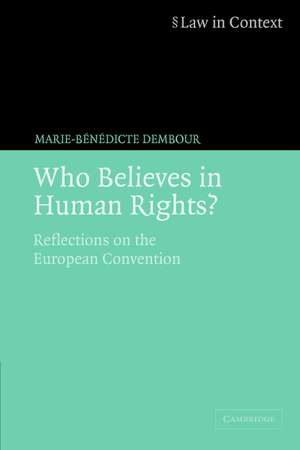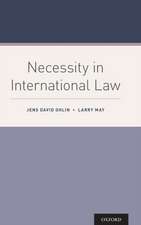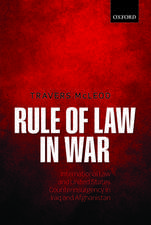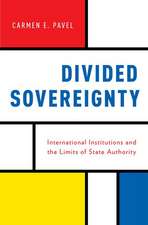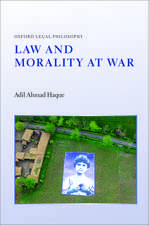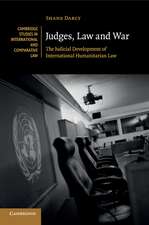Who Believes in Human Rights?: Reflections on the European Convention: Law in Context
Autor Marie-Bénédicte Dembouren Limba Engleză Paperback – 18 oct 2006
Din seria Law in Context
-
 Preț: 230.49 lei
Preț: 230.49 lei -
 Preț: 396.47 lei
Preț: 396.47 lei -
 Preț: 231.05 lei
Preț: 231.05 lei -
 Preț: 315.01 lei
Preț: 315.01 lei - 9%
 Preț: 699.67 lei
Preț: 699.67 lei -
 Preț: 416.21 lei
Preț: 416.21 lei -
 Preț: 234.79 lei
Preț: 234.79 lei -
 Preț: 230.06 lei
Preț: 230.06 lei - 14%
 Preț: 869.10 lei
Preț: 869.10 lei -
 Preț: 231.76 lei
Preț: 231.76 lei -
 Preț: 321.38 lei
Preț: 321.38 lei -
 Preț: 274.34 lei
Preț: 274.34 lei -
 Preț: 314.81 lei
Preț: 314.81 lei -
 Preț: 278.81 lei
Preț: 278.81 lei -
 Preț: 233.26 lei
Preț: 233.26 lei - 9%
 Preț: 663.35 lei
Preț: 663.35 lei -
 Preț: 395.99 lei
Preț: 395.99 lei -
 Preț: 317.27 lei
Preț: 317.27 lei -
 Preț: 388.95 lei
Preț: 388.95 lei -
 Preț: 380.93 lei
Preț: 380.93 lei -
 Preț: 267.63 lei
Preț: 267.63 lei - 9%
 Preț: 697.36 lei
Preț: 697.36 lei -
 Preț: 201.95 lei
Preț: 201.95 lei - 14%
 Preț: 826.72 lei
Preț: 826.72 lei -
 Preț: 353.89 lei
Preț: 353.89 lei -
 Preț: 267.88 lei
Preț: 267.88 lei - 14%
 Preț: 701.93 lei
Preț: 701.93 lei - 11%
 Preț: 495.94 lei
Preț: 495.94 lei -
 Preț: 334.96 lei
Preț: 334.96 lei - 11%
 Preț: 497.03 lei
Preț: 497.03 lei -
 Preț: 447.63 lei
Preț: 447.63 lei - 11%
 Preț: 567.59 lei
Preț: 567.59 lei - 11%
 Preț: 422.74 lei
Preț: 422.74 lei -
 Preț: 453.38 lei
Preț: 453.38 lei - 11%
 Preț: 607.85 lei
Preț: 607.85 lei -
 Preț: 401.19 lei
Preț: 401.19 lei -
 Preț: 361.16 lei
Preț: 361.16 lei - 11%
 Preț: 581.08 lei
Preț: 581.08 lei -
 Preț: 286.30 lei
Preț: 286.30 lei - 11%
 Preț: 687.20 lei
Preț: 687.20 lei -
 Preț: 394.81 lei
Preț: 394.81 lei
Preț: 514.68 lei
Preț vechi: 578.29 lei
-11% Nou
Puncte Express: 772
Preț estimativ în valută:
98.48€ • 102.82$ • 81.51£
98.48€ • 102.82$ • 81.51£
Carte tipărită la comandă
Livrare economică 04-18 aprilie
Preluare comenzi: 021 569.72.76
Specificații
ISBN-13: 9780521683074
ISBN-10: 0521683076
Pagini: 340
Ilustrații: 4 tables
Dimensiuni: 153 x 229 x 21 mm
Greutate: 0.5 kg
Ediția:New.
Editura: Cambridge University Press
Colecția Cambridge University Press
Seria Law in Context
Locul publicării:Cambridge, United Kingdom
ISBN-10: 0521683076
Pagini: 340
Ilustrații: 4 tables
Dimensiuni: 153 x 229 x 21 mm
Greutate: 0.5 kg
Ediția:New.
Editura: Cambridge University Press
Colecția Cambridge University Press
Seria Law in Context
Locul publicării:Cambridge, United Kingdom
Cuprins
Table of cases; 1. Introduction; 2. The Convention in outline; 3. The Convention in a realist light; 4. The Convention in a utilitarian light; 5. The Convention in a Marxist light; 6. The Convention in a particularist light; 7. The Convention in a feminist light; 8. The human rights creed in four schools; 9. Conclusion: In praise of human rights nihilism; Appendices; Select bibliography; Index.
Recenzii
'There are thousands of books on human rights, hundreds on human rights law. This one will stand out as one of the very best.' Adam Tomkins, John Millar Professor of Public Law, University of Glasgow
'More Europeans believe in human rights than believe in God. Their oracle - at Strasbourg, not Delphi - is tended by a priesthood of judges and law professors culled from 46 countries, divining the basic rights of humankind. The author provides a valuable and necessary critique of their work, as it is beginning to affect the lives of millions previously downtrodden by state power in Russia and Eastern Europe.' Geoffrey Robertson QC
'This precious work illuminates the rather normatively dense, and often darkening, landscapes of the European human rights law and jurisprudence and carries some profound and immense messages for the construction of comparative, and compassionate, social theory of, and action for, human rights. ' Upendra Baxi, Professor of Law, University of Warwick
'Demour brilliantly challenges lazy assumptions about the universal and natural character of human rights. Her command of European Court jurisprudence allied with her broad knowledge of Western philosophy makes this a tour de force in legal and political anthropology.' John Bowen, Dunbar-Van Cleve Professor in Arts & Sciences, Washington University, St Louis
'Dembour's book is a timely contribution to the existing literature on human rights. Even leaving aside her useful and original methodology, the book provides a good introduction to the European Convention system and its strengths and weaknesses.' The International Journal of Human Rights
'Marie-Bénédicte Dembour subjects the idea of human rights and the legal product of the European Court of Human Rights to an original and compelling theoretical analysis in search of an anser to her questions: 'can we believe in human rights?' and 'should we believe in human rights?' … This book is genuinely a tour de force which should be read by anyone who has ever asked themselves whether human rights is an adequate or appropriate way of delivering just and compassionate action. Perhaps even more, it should be read by those who have not.' Electronic Immigration Network
'The themes [the author] discusses so eloquently have long constituted the key sites of human rights criticism. But they are rarely treated as discursively and revealingly as here.' The Modern Law Review
'More Europeans believe in human rights than believe in God. Their oracle - at Strasbourg, not Delphi - is tended by a priesthood of judges and law professors culled from 46 countries, divining the basic rights of humankind. The author provides a valuable and necessary critique of their work, as it is beginning to affect the lives of millions previously downtrodden by state power in Russia and Eastern Europe.' Geoffrey Robertson QC
'This precious work illuminates the rather normatively dense, and often darkening, landscapes of the European human rights law and jurisprudence and carries some profound and immense messages for the construction of comparative, and compassionate, social theory of, and action for, human rights. ' Upendra Baxi, Professor of Law, University of Warwick
'Demour brilliantly challenges lazy assumptions about the universal and natural character of human rights. Her command of European Court jurisprudence allied with her broad knowledge of Western philosophy makes this a tour de force in legal and political anthropology.' John Bowen, Dunbar-Van Cleve Professor in Arts & Sciences, Washington University, St Louis
'Dembour's book is a timely contribution to the existing literature on human rights. Even leaving aside her useful and original methodology, the book provides a good introduction to the European Convention system and its strengths and weaknesses.' The International Journal of Human Rights
'Marie-Bénédicte Dembour subjects the idea of human rights and the legal product of the European Court of Human Rights to an original and compelling theoretical analysis in search of an anser to her questions: 'can we believe in human rights?' and 'should we believe in human rights?' … This book is genuinely a tour de force which should be read by anyone who has ever asked themselves whether human rights is an adequate or appropriate way of delivering just and compassionate action. Perhaps even more, it should be read by those who have not.' Electronic Immigration Network
'The themes [the author] discusses so eloquently have long constituted the key sites of human rights criticism. But they are rarely treated as discursively and revealingly as here.' The Modern Law Review
Notă biografică
Descriere
Commentary on the European Convention and a groundbreaking work of theory which challenges human rights orthodoxy.
